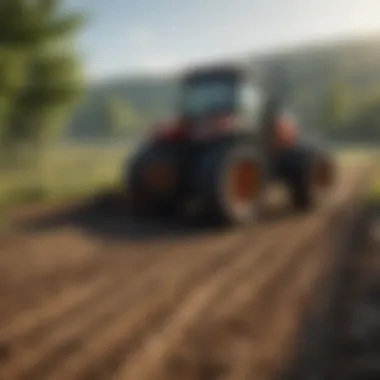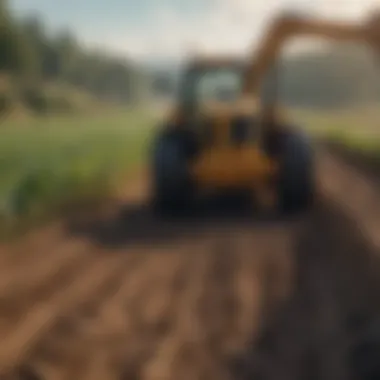Line Construction Jobs in Agriculture: Insights and Opportunities


Intro
Line construction jobs play a vital role in agriculture, serving as the backbone of infrastructure that supports farming practices. These jobs encompass a variety of positions focused on building and maintaining the systems necessary for efficient agricultural production. From utility lines that deliver water and electricity to the installation of irrigation systems, these roles are critical for modern farming operations.
Understanding the significance of line construction jobs helps to highlight their contribution to the agricultural sector. Workers in this field not only ensure that farms run smoothly but also contribute to the sustainability of agricultural practices. As the industry evolves with advancements in technology, the skills and knowledge needed in line construction are also shifting, necessitating a deeper understanding of these roles.
Understanding Line Construction in Agriculture
In the modern agricultural landscape, the role of line construction cannot be understated. It serves as a backbone for various agricultural practices. Line construction jobs encompass tasks that ensure essential utilities, such as water, electricity, and communication, are available to farming operations. Understanding the nuances of these jobs is key for industry stakeholders.
Definition of Line Construction Jobs
Line construction jobs refer to the specialized work involved in setting up, maintaining, and repairing the physical structures that support agricultural operations. This can include utility line installation, irrigation systems, and land division fencing. Workers in this field must navigate both technical and physical challenges. This makes expertise in these specific areas crucial. Workers might handle machinery, electrical setups, or manual labor, depending on the task at hand.
Significance of Line Construction in Agriculture
The significance of line construction in agriculture is multi-faceted. Proper installation of utility lines is vital for the efficiency of farming operations. Electricity powers equipment, while water is essential for crop irrigation. The construction of these lines ensures that agricultural practices function optimally.
Moreover, it contributes positively to the sustainability of farming. For example, well-constructed irrigation systems help in conserving water resources. These techniques enhance the productivity of land while minimizing waste.
"Effective line construction helps to boost agricultural productivity through improved access to necessary resources."
Employing proper land division methods through fencing ensures effective land management. This is crucial for crop rotation and livestock control, further indicating the broad impact line construction has on agricultural success. In the long run, investing time and resources into line construction yields benefits that can transform agricultural practices entirely.
Types of Line Construction Jobs
Understanding the various types of line construction jobs in agriculture is crucial for grasping the scope and demand in this sector. These jobs not only contribute to the agricultural infrastructure but also enable farmers to maximize productivity and manage resources effectively. As agricultural practices continue to evolve, the demand for diverse line construction roles grows significantly. Here, we delve into three prominent types of line construction jobs: utility line construction, irrigation system installation, and fencing and land division.
Utility Line Construction
Utility line construction encompasses the installation and maintenance of power, water, and communication lines that are essential for modern farming operations. This type of construction ensures that farmers have access to electricity for equipment, reliable water supply for crops, and communication services to facilitate effective management.
The roles involved in utility line construction can vary, but they often require technical skills along with the ability to work and perform tasks at heights, and a strong understanding of safety protocols. For example, workers may have to climb poles or work with heavy machinery.
Furthermore, proper utility line setup can drastically improve a farmer's ability to operate efficiently, reduce downtime, and enhance overall productivity. Not to mention, it plays a critical role in hooking up renewable energy sources, such as solar or wind, that are becoming increasingly popular in farming.
Irrigation System Installation
Efficient water management is paramount in agriculture, making irrigation system installation a key line construction job. Specialists in this field design, install, and maintain irrigation systems that ensure crops receive adequate and timely watering. These professionals must evaluate the specific needs of various crops and the characteristics of the land to create the most effective irrigation strategy.
The installations can vary from simple drip irrigation to complex sprinkler systems that cover expansive areas. With climate variability threatening agricultural yield, a well-designed irrigation system helps farmers conserve water and optimize crop health. Investment in skilled labor for irrigation setup can yield substantial returns through improved crop performance.
Fencing and Land Division
Fencing and land division jobs are crucial for managing agricultural land effectively. Properly installed fences serve multiple purposes, including protecting crops from wildlife, delineating property boundaries, and managing livestock. Craftsmen in this area need to have a good understanding of different fencing materials, including wood and wire, as well as the best practices for land division.
Adequate fencing can reduce crop loss and improve overall farm management. Furthermore, dividing the land appropriately allows farmers to rotate crops efficiently and implement strategies for sustainable land use.
The construction work involved entails not just knowledge of materials but also the necessary skills to accommodate the specific geography of the land.
In summary, line construction jobs like utility line construction, irrigation system installation, and fencing are vital to ensuring effective agricultural practices. Each type of job requires a unique combination of skills and knowledge, which contribute to overall farm sustainability and productivity.


Skills Required for Line Construction Jobs
In the field of line construction in agriculture, possessing the right skills is essential for success. These skills not only encompass technical knowledge but also include physical prowess and cognitive abilities. Professionals in this field must be equipped to handle various tasks that demand precision and attention to safety. Understanding the importance of these skills can greatly enhance one's ability to thrive in line construction jobs.
Technical Skills and Training
Technical skills form the backbone of line construction jobs. Workers are expected to have a deep understanding of construction principles, machinery operation, and agricultural technology. Training programs often provide insight into blueprint reading, utility installation, and system maintenance. Familiarity with specific tools also matters; tools can include trenchers, bulldozers, and wire strippers.
Many employers prefer candidates who have completed formal education in fields such as construction technology or agricultural engineering. Courses in these areas provide foundational knowledge that is invaluable on the job. Furthermore, continuous education and certifications can help professionals stay up-to-date with industry standards and technological advancements.
Physical Requirements and Endurance
Physical fitness is another critical aspect of line construction jobs. The job often involves physically demanding tasks that require strength, stamina, and flexibility. Workers may find themselves lifting heavy objects, climbing structures, or working in difficult terrain. High endurance is needed to perform tasks effectively throughout long shifts, especially in varying weather conditions.
It is important for workers to prioritize their physical health. Regular exercise and a balanced diet can enhance overall capabilities. Moreover, strength training can be particularly beneficial, aiding in both injury prevention and overall job performance.
Problem-Solving and Adaptability
Problem-solving abilities are invaluable in line construction jobs. These roles can present unexpected challenges, such as equipment failures or unpredicted weather changes. Workers must be capable of quickly assessing situations and developing effective solutions. This may involve adjusting plans, creatively using resources, or tapping into a network of colleagues for assistance.
Adaptability is equally crucial. As technology evolves, new methods and tools continuously change the landscape of line construction. Workers who can adapt to these changes without compromising safety or efficiency will thrive in their careers. Continuous learning and a willingness to embrace new techniques can significantly enhance a worker's expertise and employability.
"In line construction jobs, a blend of technical skills, physical fitness, and a sharp mind is vital for success."
The necessary skills required for line construction jobs are not just checkboxes on a resume. They represent a combination of practical training, physical capability, and mental agility. Mastering these skills ensures that individuals are prepared to tackle the challenges they will face in the agricultural sector.
Educational Pathways in Line Construction
The realm of line construction in agriculture is not only significant but also requires a solid foundation of knowledge and skills. Consequently, educational pathways play a cruxial role for anyone looking to thrive in this field. They provide not just theoretical knowledge but practical skills necessary for tackling real-life challenges in agriculture. Understanding the educational options helps aspiring professionals map out their careers effectively, ensuring they are well-prepared for the demands of this specialized work.
Relevant Academic Programs
A variety of academic programs cater to individuals interested in line construction jobs. These programs is designed to provide a solid grounding in relevant concepts. Some of the key areas of focus in these programs include civil engineering, agricultural engineering, and environmental science. Each discipline imparts unique skills essential for construction and maintenance of agricultural infrastructure.
Students may find programs at technical schools, community colleges, and universities. These programs usually incorporate hands-on training, allowing students to gain practical experience in the field. Furthermore, curriculum often covers regulations, design principles, and environmental impacts of construction work.
- Key programs include:
- Associate degrees in Construction Technology
- Bachelor's degrees in Agricultural Engineering
- Certifications in Utility Line Construction
Each of these options prepares students for the dynamic and multifaceted nature of line construction in agriculture. Graduates leave with not only theoretical knowledge but also practical skills that can be directly applied in their jobs.
Certifications and On-the-Job Training
In addition to formal academic qualifications, certifications offer a robust way to enhance skills and employability in line construction. They demonstrate a commitment to the profession and ensure that individuals have met specific industry standards. Various organizations provide relevant certifications focusing on specialized skills such as safety procedures or specific construction practices.
Moreover, on-the-job training is invaluable. Many employers actively seek candidates who are willing to learn through experience. This type of training is not only beneficial for job seekers but also for companies, as they can mold employees to meet their specific needs.
Common certifications available include:
- OSHA Safety Certification
- National Center for Construction Education and Research (NCCER) certifications
- American Concrete Institute (ACI) certifications


The combination of academic learning and practical training provides a strong basis for a successful career in line construction. Engaging in both paths enhances one’s qualifications and prepares them for various roles within the agricultural sector.
"Investing in education and practical experience is vital for anyone aiming for success in the line construction field."
Overall, educational pathways serve as the groundwork for professional development in line construction jobs. Understanding these pathways is crucial for aspiring professionals aiming to make meaningful contributions to agriculture.
Career Advancement Opportunities
Career advancement in line construction jobs is essential for both professional growth and the overall health of the agricultural sector. With the agricultural landscape evolving rapidly due to changing technologies and practices, skilled workers have better prospects for upward mobility. This section discusses entry-level positions, mid-level management roles, and entrepreneurial ventures, emphasizing how each contributes to personal and professional development in line construction.
Entry-Level Positions
Entry-level positions in line construction are crucial for newcomers looking to build their careers. These roles often require basic skills and can be a stepping stone to more advanced opportunities. Typical entry-level jobs include construction laborers, equipment operators, and maintenance technicians. Individuals starting in these roles can expect to gain hands-on experience and learn from seasoned professionals. This early exposure is vital, as it helps in honing necessary skills like teamwork, safety protocols, and hands-on technical knowledge.
In many cases, these positions also offer pathways to training programs and apprenticeships, which can further enhance skills and improve job prospects. What’s important is that entry-level roles often provide a broad understanding of the agricultural infrastructure, helping people decide which areas interest them most for future specialization.
Mid-Level Management and Supervisory Roles
Transitioning into mid-level management and supervisory roles represents a significant step up in any career. These positions are often reached after gaining sufficient experience, acquiring relevant certifications, or completing advanced training. Job titles in this category may include project manager, site supervisor, or operations manager. These individuals oversee projects, ensuring that they are executed safely and efficiently while managing teams on-site.
Responsibilities include budget management, communication with stakeholders, and the enforcement of safety regulations. Mid-level roles allow for more influence over the business processes and offer candidates the opportunity to lead others, which can be rewarding and fulfilling. Success in these positions often requires not just technical expertise but also strong leadership skills and the ability to inspire others, making it a critical stage in career advancement.
Entrepreneurial Ventures in Line Construction
The agricultural sector increasingly welcomes entrepreneurial ventures related to line construction. As agriculture becomes more technologically advanced, opportunities abound for those who wish to start their own companies. Some may focus on specialized installations, such as advanced irrigation systems or smart fencing solutions. Others might offer consulting services for safety compliance on construction sites.
Entrepreneurship in this field requires a mix of industry knowledge, risk tolerance, and business acumen. Success in such endeavors can lead to significant financial rewards and contribute to advancements within the agricultural sector itself. Individuals considering this path benefit from continually learning about market trends and actively engaging with stakeholders.
In summary, career advancement in line construction jobs offers diverse pathways for growth, making it an attractive field for those committed to their professional development. Whether starting in entry-level positions, moving into management, or venturing into entrepreneurship, the opportunities in this area can lead to meaningful and impactful careers.
Safety Considerations in Line Construction
In the realm of line construction within agriculture, safety considerations hold paramount importance. This aspect cannot be overstated as it directly affects the well-being of workers, operational efficiency, and overall project success. Addressing safety in line construction jobs ensures that workers are not only following best practices but are also protected from potential hazards that may be present in the field. A culture of safety fosters an environment where individuals are aware, prepared, and able to respond effectively to emergencies.
Common Hazards and Risks
The line construction sector is fraught with several hazards. Workers may encounter risks related to equipment operation, exposure to high-voltage lines, and environmental dangers such as inclement weather. Common hazards include:
- Electrical Hazards: Working near power lines can lead to electrocution if proper precautions are not taken.
- Heavy Machinery Risks: Equipment like tractors or excavators can pose risks of injury if not operated safely.
- Slips, Trips, and Falls: Uneven terrain, mud, or debris can contribute to these incidents.
- Chemical Exposure: Pesticides and fertilizers, if mishandled, can have severe health consequences.
Taking proactive measures can greatly reduce these risks. Implementing regular safety training and fostering communication among team members enhance awareness of potential dangers.
Regulatory Standards and Compliance
Compliance with regulatory standards is vital for maintaining safety in line construction jobs. Various organizations set forth guidelines that must be adhered to, such as the Occupational Safety and Health Administration (OSHA) in the United States. These regulations encompass multiple areas:
- Training Requirements: Workers must be properly trained before operating heavy machinery or working near utilities.
- Protective Gear: The use of personal protective equipment (PPE) like helmets, gloves, and safety footwear is often mandated.
- Site Safety Plans: Employers are required to develop and implement safety plans that outline protocols for hazardous situations.
Ensuring compliance with these standards not only enhances safety but also minimizes legal liabilities. Failing to follow regulations can have dire consequences including fines or loss of credibility in the industry.
"Safety is not just a priority, it is a way of life in line construction."


By prioritizing safety measures, stakeholders in agricultural line construction can protect their most valuable asset—their workforce. Conclusively, understanding the hazards and ensuring compliance with safety regulations will create a safer work environment and improve the overall quality of projects completed.
Technological Advancements in Line Construction
Technological advancements play a crucial role in the development and efficiency of line construction jobs within agriculture. As the demand for sustainable and productive farming practices increases, the integration of innovative tools and technologies becomes imperative. These advancements not only enhance the effectiveness of operations but also contribute to the safety and sustainability of agricultural practices. Therefore, understanding these technologies is vital for professionals in the field to stay competitive and meet evolving industry demands.
Emerging Technologies Impacting the Field
Various emerging technologies are reshaping the landscape of line construction in agriculture. These include:
- GPS Technology: Global Positioning System (GPS) provides precise location data, crucial for planning and executing line construction projects. This aids in ensuring accuracy in installations, minimizing errors, and optimizing land use.
- Drones: Unmanned aerial vehicles are being utilized for aerial surveys and inspections. They provide real-time data on terrain and vegetation, allowing for better planning and management of construction tasks.
- Remote Sensing: This technology captures images and data from the Earth's surface. It is useful in monitoring crop health, soil conditions, and the overall agricultural landscape, assisting in informed decision-making regarding line construction jobs.
- Smart Sensors: Sensors can monitor various conditions in real-time, such as soil moisture and temperature. They help in optimizing the setup of irrigation systems and other infrastructure, leading to improved agricultural productivity.
These technologies are not just trends. They fundamentally transform how line construction jobs are approached, leading to enhanced planning, execution, and maintenance.
Integration of Automation and Robotics
The integration of automation and robotics into line construction is gaining traction. This shift shows significant potential in terms of improving efficiency and reducing labor costs.
- Automation in Installation Processes: Automated machinery used in the installation of utility lines or irrigation systems streamlines operations, allowing for accelerated project completion. This technology reduces the need for manual labor and enhances worker safety by limiting exposure to hazardous environments.
- Robotic Equipment: Autonomous vehicles and robotic arms can undertake repetitive tasks, ensuring precision in construction. This may include laying down pipes or constructing fences without requiring constant human oversight.
- Data Analytics: Advanced data analytics enables the monitoring of equipment performance and project progress. This leads to proactive maintenance, minimizing downtime and maximizing productivity.
Future Trends in Line Construction Jobs
The landscape of line construction jobs in agriculture is evolving. Understanding these future trends is vital for stakeholders who want to adapt and thrive in this sector. Factors such as sustainability, technological advancements, and market demand influence how line construction roles will manifest in the coming years. Addressing these trends can not only enhance operational efficiency but also foster a more sustainable agricultural environment.
Sustainability and Eco-Friendly Practices
Sustainability is becoming a central theme in modern agricultural practices, including line construction. The emphasis on eco-friendly protocols aims to reduce environmental impact while enhancing productivity. For instance, using renewable materials for fencing and irrigation systems contributes to long-term sustainability. Professionals in line construction should prioritize these practices to meet increasing regulatory demands and consumer expectations for greener solutions.
Benefits of sustainable practices in line construction:
- Reduced carbon footprint: Utilizing local materials and energy-efficient techniques helps in lowering emissions.
- Soil preservation: Implementing proper line structures prevents soil erosion, promoting healthier land.
- Water conservation: Effective irrigation systems designed with sustainability in mind can significantly reduce water waste.
"Sustainable practices are not just a regulatory requirement; they are an opportunity to innovate within the agricultural sector."
Projected Job Market Growth
The job market for line construction roles within agriculture is projected to grow significantly. Increased investments in infrastructure and technology enhancements are key drivers. As agricultural demands increase, so does the need for skilled workers capable of managing complex line construction tasks.
Factors contributing to this growth include:
- Technological integration: The incorporation of smart technologies in irrigation and utility lines creates new roles. Workers need training in advanced systems.
- Population growth: A rising global population requires more effective agricultural systems, boosting demand for line construction.
- Aging workforce: Many experienced professionals are nearing retirement, leaving gaps that new workers will need to fill.
These developments present opportunities that can pave the way to a resilient agricultural industry.
Finale
The conclusion serves as a key component of any comprehensive discussion regarding line construction jobs in agriculture. This article has explored various facets, subsequently reinforcing the importance of these roles. The insights provided reflect not just the intricate nature of construction tasks, but also the broader implications they hold for productivity in agriculture.
Recap of Key Points
To summarize, several essential points came through in our examination:
- Understanding of Line Construction: We established a foundation of what line construction jobs encompass and their critical significance in agricultural settings.
- Types of Jobs: Different roles such as utility line construction, irrigation system installation, and fencing were detailed, highlighting their unique contributions to agricultural viability.
- Required Skills: Essential skills were identified, including technical knowledge and problem-solving abilities crucial for success in the field.
- Career Pathways: The article provided insights into educational programs and certifications that can pave the way for advancements in this specialized area.
- Safety and Compliance: A discussion of safety considerations underscored the importance of adhering to industry regulations and standards, which delineates a responsible approach to construction work.
- Technological Innovations and Future Trends: The impact of emerging technologies and sustainability practices indicates that the field is evolving, offering more opportunities.
Encouragement for Aspiring Professionals
As aspiring professionals ponder a career in line construction jobs, it is crucial to recognize the myriad opportunities awaiting them. The agricultural sector is not only foundational to the economy but also ripe for innovation and advancement. Investing time in acquiring relevant skills and qualifications can yield significant returns. Additionally, given the ongoing evolution of agricultural technologies, professionals can expect their roles to enjoy enhanced importance in the years to come. Taking bold steps now can lead to fulfilling careers in this essential and growing field.



